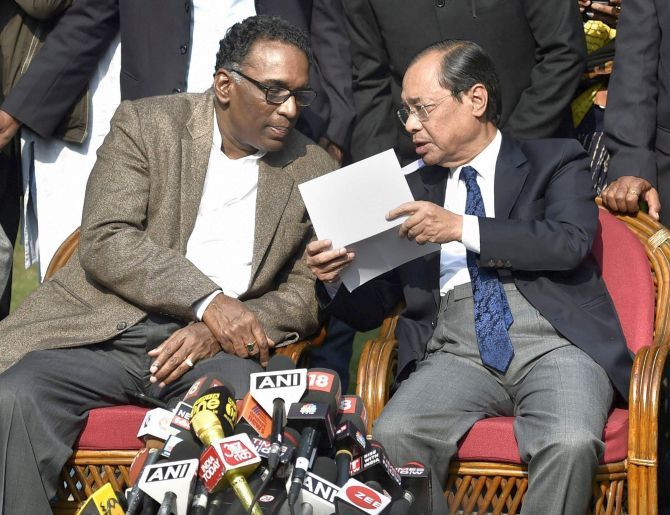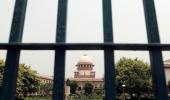Having declared democracy in danger at a famous press conference in January, the newly sworn-in chief justice's stint of 1 year and 44 days will be keenly watched for what he does to defend this ideal, notes M J Antony.

The misgivings of the legal profession and the cynics over the past eight months of turmoil in the country's highest court came to nothing.
Despite all the angst following his famous 'rebel' press conference with three other judges in January this year, Justice Ranjan Gogoi was not sidelined.
Instead, Chief Justice Dipak Misra, against whom the protest presser was organised, stuck to convention by elevating the senior-most judge of the Supreme Court to the nation's highest judicial pedestal.
This decision, which the government is traditionally bound to accept, exorcised the ghost of two past instances when convention was flouted to wreak vengeance on the judiciary for passing inconvenient judgments -- or in Justice Gogoi's case, highlighting inconvenient facts.
Speculators had enough cause to worry about the return of the supersession syndrome of the Indira Gandhi era. After all, Justice Gogoi was among the four senior-most judges who staged an unprecedented revolt against the chief justice and warned that democracy was in danger.
He joined the three rebels to allege that sensitive cases were being assigned to benches of the chief justice's choice without any apparent criterion.
When the storm broke after the January 12 presser, Justice Gogoi assured the public that all differences would be sorted out within the institution.
What he predicted has now come true. There are no festering wounds to be healed, apparently.
Since Justice Gogoi had raised such an alarm over the danger to democracy from the judicial front, his administrative performance during the term of one year and 44 days will be watched with keen interest.
He has not explained in detail how democracy is in danger. So his deeds in the coming months would be the only clue to back up the allegation. He is the administrative head of the nation's judiciary, and it cries out for reforms.
The Supreme Court wrote last month that the subordinate courts are on a 'ventilator' and are starved for funds for even basic necessities.
The situation in the appellate courts is no better.
Two CJIs in recent times compared the ambience in the Supreme Court to that of a fish market. It would take herculean efforts to reverse the state of affairs and tackle the insurmountable arrears.
Justice Gogoi will soon have a new collegium to assist him, especially to steer him through the sticky distance between judiciary and the executive.
On the judicial front, he has more than a handful of crucial issues, touching upon the future of the polity. The Ayodhya case is before the court just as the general elections approach.
Justice Gogoi was also on the bench that asked the government to move forward on the National Register of Citizens. He is also seized of the delay in the appointment of Lokpals.
Since he will take up public interest cases, according to the roster laid down by Dipak Misra, he will have to hear more petitions with a political colour in the coming months.
Clearly, he is rowing towards turbulent waters.
However, the judge has proved to be made of sterner stuff. He was on the bench when Justice C S Karnan of the Calcutta high court was convicted for threatening judges.
When a former Supreme Court judge Markandey Katju blogged his doubts about the IQ of Supreme Court judges, he was summoned and made to apologise.
It was a Gogoi bench that banned ads with politicians' photos except those of the President, the prime minister and the CJI.
The judge generally writes short judgments devoid of frills. He ruled that under the Hindu Women's Right to Property Act, upon the death of a Hindu man, his widow became entitled to a share in the joint family property.
He recently laid down norms for raising ordinary lawyers to 'senior advocate' level, an issue that had divided the bar. He has also delivered significant judgments on trademarks, income tax and sick industries.
In a case involving mega star Amitabh Bachchan and his income from the Kaun Banega Crorepati shows, his bench quashed a Bombay high court order that rejected the revenue authorities' power to re-assess income.
The judge has a political background -- his father was once chief minister of Assam. However, it is recorded in a recent book that Keshab Chandra Gogoi did not want his son to be a chief minister, but the chief justice of the country.
This dream has now come true.
Justice Gogoi's simple habits seem to have travelled with him. He was reportedly seen buying fish from a Delhi market.
It is also said that he owns no car, nor a big house. His mother, a social worker, gave him her house. He is one of the few judges to disclose his assets on the court Web site.
Born in 1954, he started practice in the Gauhati high court after graduating from St Stephen's College, Delhi, and the law faculty there. He was elevated as a judge in the high court in 2001. He later became the chief justice of the Punjab and Haryana high court.
In 2012, he joined the Supreme Court and will retire in November next year. He is the first CJI from the north east.
Since Justice Gogoi is a man of few words and rarely seen in public platforms, what he did say recently offers some clue to his mind: 'Independent journalists and sometimes noisy judges are democracy's first line of defence'. In the same Delhi speech, he batted for a more pro-active judiciary.
These reassuring words come when there is nationwide anxiety that other institutions are failing.











